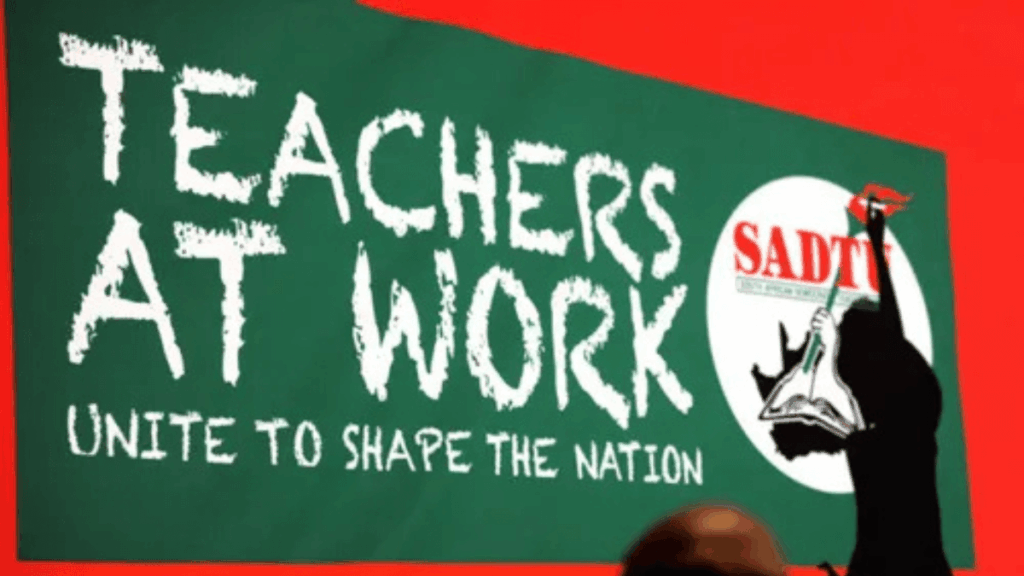The South African Democratic Teachers Union (SADTU) is one of the largest and most influential trade unions in South Africa, specifically catering to educators and teachers in the country. Founded in 1990, the union emerged as a response to the need for a union that would champion the rights and welfare of teachers during South Africa’s transition from apartheid to democracy. The union played a pivotal role in the establishment of a more equitable educational system in the country.
SADTU – South African Democratic Teachers Union
SADTU’s mission is to improve the quality of education in South Africa by advocating for the rights and working conditions of its members. This includes fighting for better wages, improved working conditions, and quality education for all South African children, regardless of their socio-economic background. In terms of political alignment, the union is known for its strong affiliation with the African National Congress (ANC) and the South African Communist Party (SACP), which is reflective of its broader ideological commitment to social justice, workers’ rights, and transformation.
Who They Represent
The union primarily represents teachers and educators within the public school system in South Africa. This includes primary and secondary school educators, as well as members who work in special education, early childhood development, and other related fields. The union also represents education workers in various government institutions, such as those involved in curriculum development, education policy, and administrative roles in the education sector.
The union’s membership encompasses a wide range of educational professionals, including classroom teachers, school principals, support staff, and education officers working at various levels of government. By representing this diverse group, the union aims to ensure the interests and voices of educators are heard at all levels of governance.
Membership Benefits
The union offers a range of benefits to its members, making it a vital union for teachers in South Africa. Key benefits include:
- Legal Aid: One of the most significant benefits of being a member of the union is access to legal support. Whether it’s dealing with workplace disputes, unfair dismissal, or other employment-related issues, SADTU provides its members with professional legal representation.
- Negotiation: The union plays an active role in collective bargaining on behalf of its members. The union negotiates on issues such as salary increases, job security, working conditions, and benefits. It ensures that educators have a strong voice in these negotiations, advocating for fair compensation and improved working environments.
- Training and Development: SADTU offers continuous professional development opportunities for teachers. This includes access to workshops, training sessions, and seminars aimed at enhancing the skills and knowledge of educators, ensuring they stay current in an evolving educational landscape.
Major Campaigns/History
The union has been involved in numerous key campaigns and strikes aimed at improving the conditions of educators and the overall quality of education in South Africa. Some of the major campaigns include:
- 1996 Teachers’ Strike: In its early years, SADTU played a significant role in a nationwide strike to demand better wages and working conditions for teachers. The strike highlighted the serious issues within the South African education system and led to some improvements in the sector.
- Pay and Working Conditions: Over the years, the union has campaigned tirelessly for better pay and working conditions for teachers. This has involved numerous strikes, negotiations, and protests aimed at ensuring educators receive the respect, compensation, and resources they deserve.
- Quality Education for All: the union has long been a vocal advocate for equitable education in South Africa. The union has consistently called for more funding for public schools, especially those in historically disadvantaged areas, and has pushed for curriculum reforms that reflect the diverse cultural landscape of the country.
Affiliations
SADTU is a member of several key organizations, which enhance its advocacy for workers’ rights and education. These affiliations include:
- Congress of South African Trade Unions (COSATU): SADTU is one of the largest affiliates of COSATU, a federation of trade unions in South Africa. This affiliation allows the union to coordinate efforts with other unions to advocate for workers’ rights across various sectors.
- Education International (EI): On an international scale, SADTU is a member of Education International, a global federation representing teachers and education workers.
Also check: COSATU – Congress of South African Trade Unions: What It Does, Who It Represents, and How to Join
How to Join
Joining SADTU is a straightforward process. Educators who wish to become members can visit the SADTU website and fill out an online application form. Membership fees are typically deducted from members’ salaries, and the costs may vary depending on the level of employment.
For detailed membership information, including costs, prospective members can visit the official SADTU website or contact their local SADTU branch.
Contact Details & Website
For more information on joining SADTU or for inquiries, you can contact them via:
- Website: www.sadtu.org.za
- Contact: SADTU national office at 011 403 1800 or email at info@sadtu.org.za
Why This Union Matters Today
SADTU remains an essential voice for educators in South Africa, especially in 2025, as the country continues to face challenges in its education sector. Issues such as overcrowded classrooms, underfunded schools, and teacher shortages are still prevalent in many parts of the country. SADTU’s role in advocating for adequate resources, improved infrastructure, and fair compensation for educators is more critical than ever.
Furthermore, as the South African government works towards closing the education gap between urban and rural areas, SADTU plays an important role in ensuring that educators and students in all areas receive equal opportunities for success. Through ongoing campaigns and negotiations, SADTU will continue to influence education policy and ensure the voices of educators are heard.






